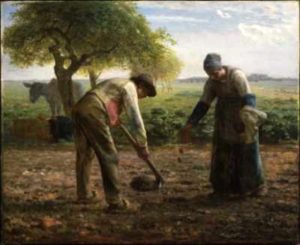27 February OS 2018: Monday of the Fourth Week of Lent; S. Procopius the Decapolite
The first reading at Vespers today is Genesis 8:21-9:7.
The LORD God commands Noah and his sons, as He had commanded Adam and Eve, to “…increase and multiply, and fill the earth, and have dominion over it.” We do not get back to Paradise by sitting around and dreaming about it. We have to work.
Two opposite extremes distort the meaning of our work on earth. Utopians say that this life is all there is, and our duty is to make heaven on earth. Their scheme distorts the meaning of work by exalting it too greatly, casting it as a pseudo-salvation. Quietists says that what we do on earth does not matter, that we need simply to crawl into a hole, pray, and be “holy,” by which, I suppose, they mean sitting in that hole, and certainly not practicing active love like the saints. Their scheme distorts the meaning of work by detaching it from our eternal destiny. They could very well summarize their philosophy in the words of Peter Pan – “Think happy thoughts” – and their “heaven” bears close resemblance to Never-Never Land. They lose Paradise through avoiding life in this world, as do the Utopians by worshipping it.
This world is temporary, not eternal as the materialists teach. God expects us to love it without being attached to it, for we look forward to a New Heaven and a New Earth, in which all the labors of man shall cease, and we will spend eternity in contemplation of the beloved God. But this world is also quite real, not an illusion as the Hindus and Buddhists teach. God made it, and He pronounced it good. He loves His creation, and He expects man, His steward, to love it too.
We practice this love by marrying and giving life to children with the courage born of faith and other-centeredness, eschewing the cowardice born of faithlessness and self-centeredness.
We practice this love through honest labor that supports our families and responsible stewardship over the good things God has given us.
We practice this love by laboring for souls, for God’s Church.
In all this, however, we do not aim to create heaven on earth, but rather to acquire heaven by making good use of our time on earth. Contrary to what the Utopians think, life on earth is not all there is – it is the arena in which we work out our eternal destiny. Contrary to what the Quietists think, life on earth requires effort – it is the arena in which we work out our eternal destiny.
Let us resolve to spend the second half of Great Lent in active labor, sacrifice, and deeds of love. At the end of this Lent, and at the end of our lives, may we hear the desired Voice:
“Well done, thou good and faithful servant: thou hast been faithful over a few things, I will make thee ruler over many things: enter thou into the joy of thy Lord.”

